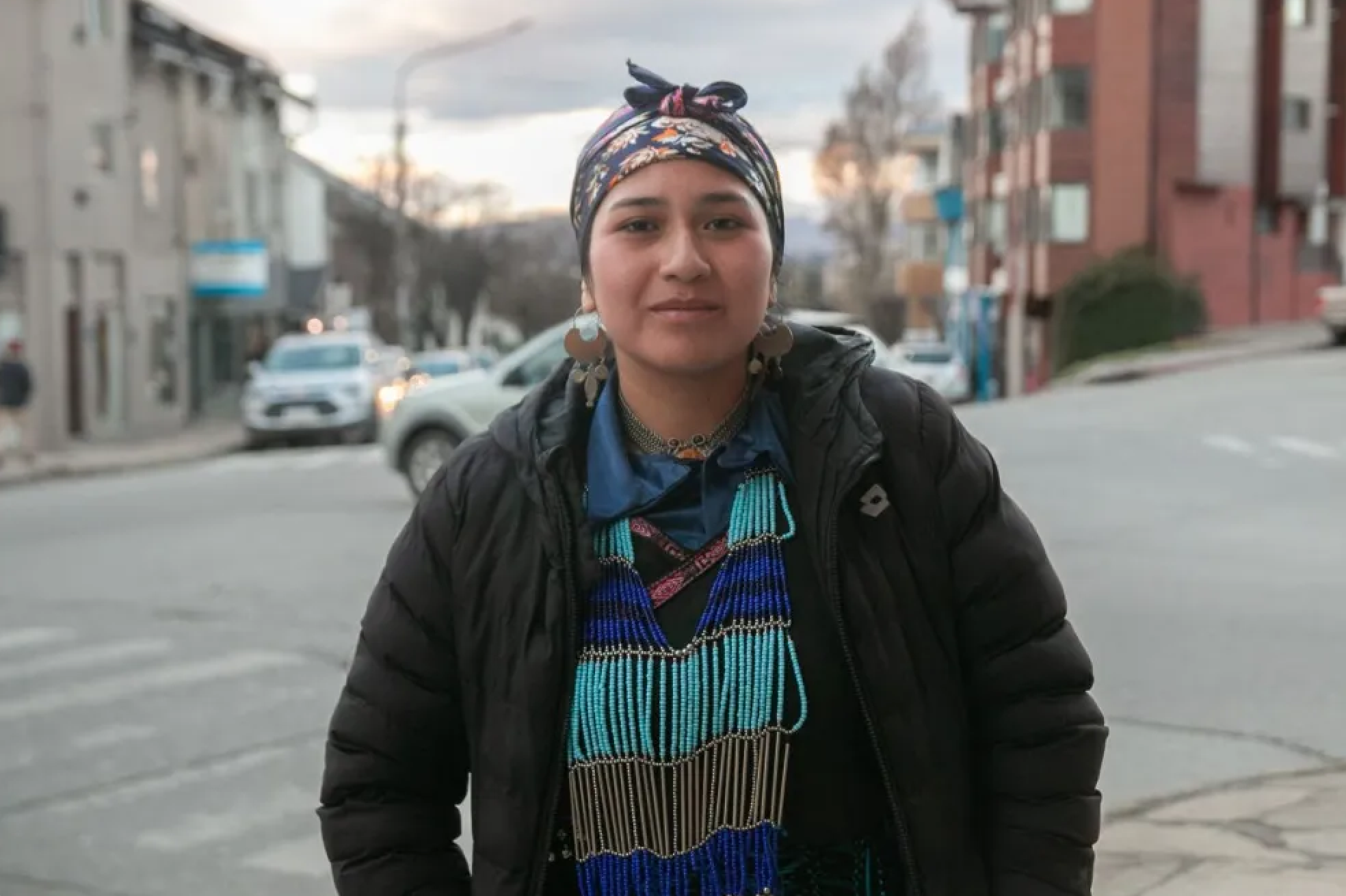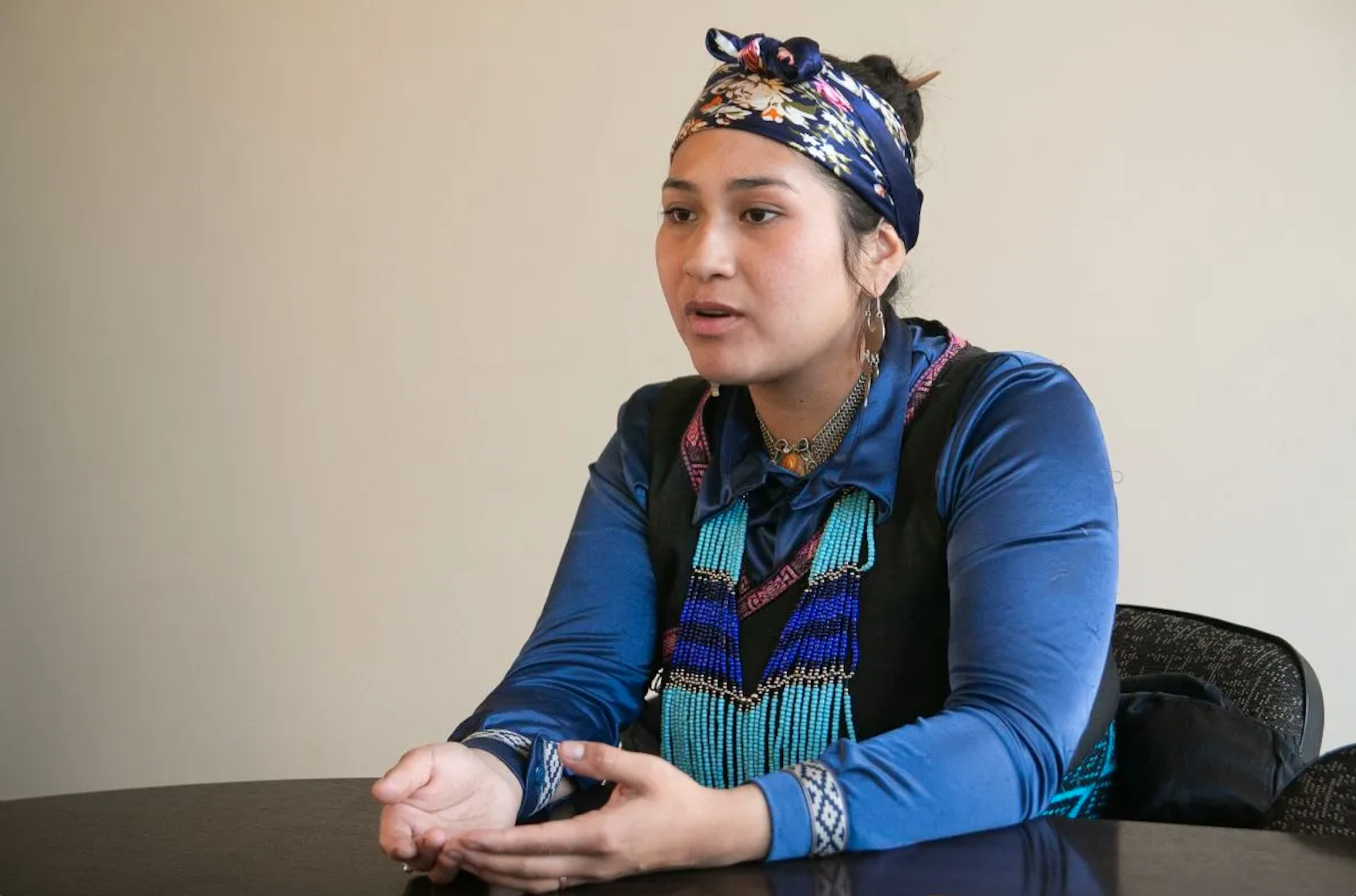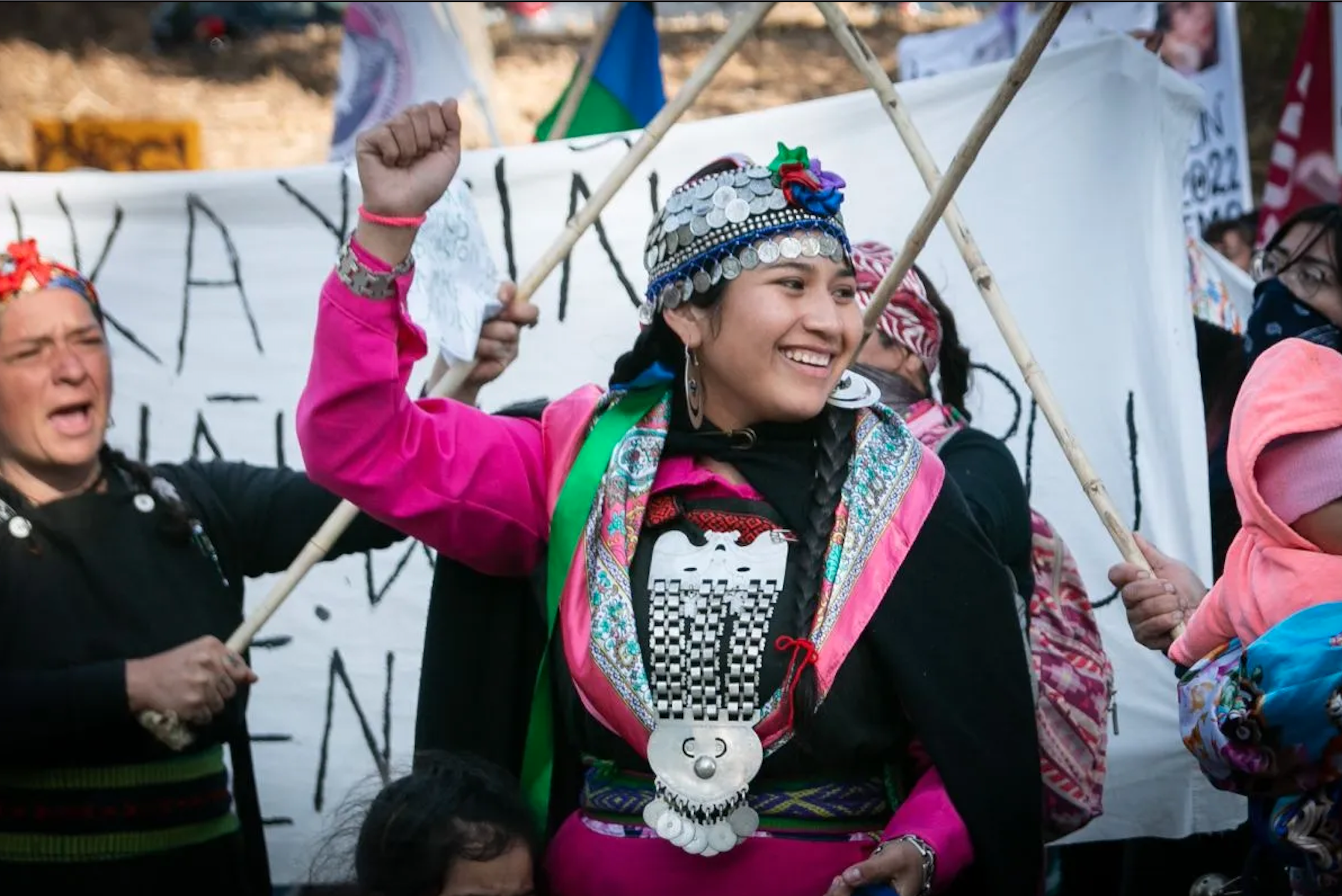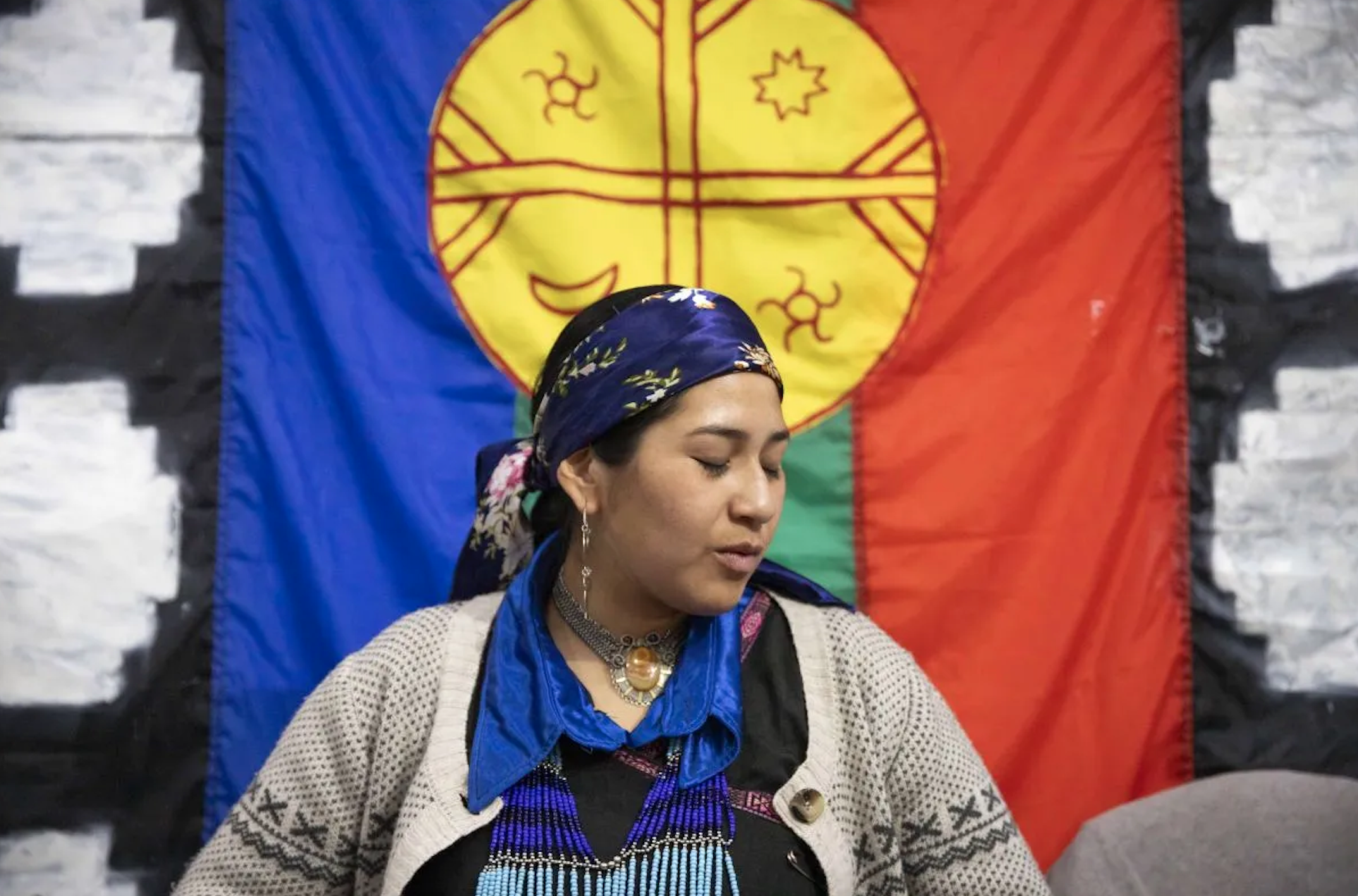
In an extensive conversation, about to face, together with other members of the Lafken Winkul Mapu community, the trial for the so-called mother cause of Villa Mascardi, the machi Betiana Colhuan Nahuel unleashes memories, reflects and gives her opinion…

What do you feel at this moment, shortly before the trial takes place?
As a community, as a mother, as a Mapuche woman, the feeling is that of feeling run over… One more time. It is part of the history that runs through us. We feel the same as our grandfathers and grandmothers, being stripped of a territory and sitting in the dock as if we were the usurpers. Again, we are singled out as violent, and the truth is that we feel violated.
What does Justice represent?
For us, it is something armed to favor a capitalist system, created for the destruction of territories and the dispossession of the native communities – Mapuche and other peoples.
In short, you do not have confidence in the Judiciary…
No, because the system is armed against us. The laws of this State, which recognize indigenous people as pre-existing, are not respected, nor are international conventions. The norms they create to recognize and repair the damage that was done during all these years of genocide against our people are not taken into account.
For you, was there usurpation?
–No. For us, it is a search for a dignified life, a territorial claim to a place that, in reality, was usurped by the State.
What do you think will happen in the trial?
The right thing would be for them to recognize the community. It must be understood that we did not take a piece of land from the area of Bariloche; we are recovering a space for the legitimate right to develop our culture. We do not claim fifty thousand hectares of what is now the Argentine State, but seven. There is an anthropological study, with researchers from the State, which the judge accepted.
That is your wish, but do you think that is what is going to happen?
If everything were correct, that’s what should happen. If not, let them condemn us as usurpers of our own territory.
Do you think it is a political issue?
Yes.
Beyond this case, based on the appeals, are you afraid that the prefects linked to the death of Rafael Nahuel will be freed?
Yes. I think everything will be favorable for them, because they are protected by the State… and by Patricia Bullrich.
What do you think of Bullrich?
She has ambition for power, and he wants to crush the most vulnerable. She is racist, she is against the Mapuche people. She celebrated the disappearance of Santiago Maldonado and the murder of our weichafe (warrior) Rafael Nahuel. She is an empty person, she does not have any positive proposals for the people, she only wants to impose her power and repress even retired grandparents… If she does this with them, what can happen to us?
What would you say to those who describe them as violent?
It’s difficult, because unconscious society believes that this is a football match: patriotic Argentines against terrorist Indians. In reality, this is not the case. In addition, a large part of the people who criticize us descend from native peoples, and the non-Mapuche who brand us as violent are, precisely, grandchildren of genocide. What else can we expect from these people? There is a people impoverished of values and awareness of their roots. Eighty percent of the population of Bariloche is Mapuche, with an indigenous face and surname. The State itself makes people believe that we have to be on one side or the other, and it motivates us to be ashamed of our own culture, of our identity. First, we must recognize the violence exercised from the genocidal campaign of Julio Argentino Roca to the present day, where our rights are violated by wearing a face.
But… and the violence in Mascardi?
There were several armed set-ups against the community, from 2017 until now. Some of them pointed to burnings, violence… For example, they accuse us of usurping the former hotel of Villa Mascardi, and we never did it. It’s a lie. It was an uninhabitable place. It had been abandoned for years, falling apart. The structure was badly damaged. Many people came from the neighborhoods of Bariloche and took things, because there were also vehicles lying around. We never inhabited that space.
Did you take things from there?
Yes and no… At the end of the recovery, we took out some elements to reuse.
What it says is that you were not the ones who started to take those things out…
–No, the place was already in that state when we arrived.
What did you build your rukas (Mapuche houses) with?
There was a lot of dry wood lying around in the place. Also, planting pine trees, which, as far as possible, we try to cut so that it does not continue to advance in the native forest. With that we lift the rukas. We always show respect for nature.
The situation that was experienced in Los Radales, with the attack on the Gendarmerie booth, do you say that it was a set-up?
Yes, an excuse to be able to advance on the territory of the community. We didn’t do it.
What happened to the children of the community in the eviction operations?
In 2017, the children were about three years old, and there were babies too. They were gassed…. They created a trauma that they could never erase, they grew up with it. In 2022, at six in the morning the shots began, and the children had the clarity in their minds that they did not want to go through the same thing again, that is, arrest, gas… When the police entered, they were with their mothers… Without speaking, they decided to leave. The forces made the decision to follow them as they shot them. They were fourteen, eleven, eight and six years old… They returned in the evening. They all ended up with rubber bullet marks on their bodies, in addition to the effect of the gas on their eyes for about two days.
Why, when the eviction took place in 2022, were there only women and children? What happened to men?
We make a commitment to the sacred ceremonial space, to the rewe, which is for life. That space saw the birth of our children, who grew up there. We are even willing to give up our lives, as Rafael Nahuel did. That is why, when the repressive state forces arrived, the rewe defended itself as best it could. We never denied that we made a self-defense of that space. When they came to shoot at us, we defended against them with stones. The men of the community protected that space with slingshots, and while they did so they gave us time to dress our children. There were women who also defended, but almost all of us were mothers, so we had to be with the children. When self-defense could no longer be sustained, we did not want to continue exposing our parents, comrades, siblings, just so that they would be people of sacrifice. No one pays us or forces us to be Mapuche, we are Mapuche because it is born from the spirit. We assume prison with dignity. We are not ashamed to say: “We were imprisoned.” Unlike other people, we went to defend a territory, to defend life, to defend a sacred ceremonial space. It was a unanimous decision of the community to have the men and some women run up the mountain. And at that time, some children also left. That was not contemplated. Perhaps they did so out of the feeling of never wanting to be arrested again. They ran at the same time as the adults. But at one point they were told to come down.
How is the relationship of the Lafken Winkul Mapu with the rest of the Mapuche people? Are there rifts?
The Mapuche people are very large. We don’t all know each other. But we have felt supported and accompanied. When we were evicted, there were many communities that came in solidarity and others accompanied us with communiqués…
And why do you think there are Mapuche who do not support them?
Sometimes, due to ignorance. But almost everyone has supported us. Some of those who did not do so we consider to be due to “wingkamiento”, Mapuche who lost their culture.
Lately, have you had contact with the Wiritray community (historically located in the northern head of Mascardi)?
No.
–They used to have a relationship, right?
Yes.
–Since when have they not had it?
When we recovered the territory, they had an order from above. Because many of Wiritray members work for National Parks. We understand that it is part of the wingkamiento: “Let’s keep the job before supporting our siblings.” They have lost all their culture: their language, their clothing, the knowledge of the ancestors and the advice they left behind… Because we did not make ourselves alone, we were formed by grandmothers, grandfathers, older people who taught us to support each other among the Mapuche siblings. They became wingkas. It is very difficult to deal with someone who is already subdued for a salary.
From what you say, they already knew each other before 2017…
–Yes. We even went to the Wiritray community. In fact, there, before I was born, a ceremony was held with the machi Teresa Painequeo, who in a state of trance announced that on the shore of the Relmu Lafken, that same lake, a community was going to rise and a machi spirit would be born again, since in the past there had been a rewe there and that force would return. My mother was present, and many grandfathers and grandmothers who are with us today…
–What is a rewe?
A sacred territorial space, which is not defined by a number of meters.
Do you continue to go to the Villa Mascardi rewe?
Yes.
When was it for the last time?
–About five days ago.
Is it the same to go periodically as to stay there?
It’s not the same. It requires permanent care, especially due to the fact that it has been vandalized several times. There is feedback: we feed on strength, on healing; and that space, ours. There is a commitment to a territorial space that permanently needs the people who made that commitment, their children. Ceremonies were held there for which people from various communities came; about five hundred people have participated. The rewe is all that place where those who went to renew their energy and seek spiritual strength were placed. The wooden structure that was made public in several places is called chemamull, and was erected by force of the pulse of more than seventy people. It was hand-carved for an entire day.
Specifically, as a machi, is it different to live in that place than to be somewhere else?
It’s very different. There I could freely develop my work. In that space, I treated patients. People could be healed, given treatment. There were people who remained there, interned. On the other hand, far from the rewe, it is something else, because attending in a cement room I cannot go outside and look for the lawen, remedies, that are found in that territory, such as, for example, certain plants… And when the rewe is bad, our health is affected.
Nowadays, when you go to that place, what do you do?
We protect it. We are not allowed to stay… If they let us return definitively, we would not hesitate, we would return and rebuild everything, as we have done throughout history, because they looted and dispossessed us, but, nevertheless, we rose from the ashes. We are not even interested in them rebuilding the rukas (as indicated in the agreement signed on June 1, 2023 between national officials and Mapuche leaders), but we would be satisfied with them saying: “That’s it, we are going to leave you alone in your territory.” But, as we are not authorized to stay, even if it is, as far as possible, we go once a week, to take care of it. We also hold ceremonies, so that the space is strengthened together with us.
The president of the Board of Directors of the National Parks Administration, Cristian Larsen, said that the intention is to remove the rewe. If that happens, what would it mean for you?
Something very negative, a lack of respect for a place that, for us, an indigenous people, is sacred. It would be a violation of all our rights. But we are not going to give up that space. Ours is a lifelong commitment.
Beyond the fact that they removed the wooden figure, the chemamull, if they also directly prohibited access, what would they do?
The return, in the long term, will not be avoided… But, in addition, why so much cruelty? It seems illogical to us that National Park lands are given to private companies, and we, an indigenous community, with laws that support us, with the State that recognizes us as pre-existing, cannot cede seven hectares to us… We think it’s absurd.
How many times has the rewe been vandalized?
Three.
While the Unified Command was guarding the place?
Yes. Custody is not real. There is free passage for those who want to.

In general, how is the relationship with the people of Bariloche?
I participate in spaces of what is the intercultural Municipality of Bariloche, through the Pewtun fair, which has been going on for three years. I’m going with lawen… I also attended the fair of 25 de Mayo and Onelli. Many people ask me about my clothes, because every day I dress like this. I tell them that I am Mapuche. There are times when I recognize faces and tell them that they are too. Many already know who I am, not because of the problems linked to Mascardi, because there are those who do not know about it, but who know me as a person. And in the supermarket they asked me: “Where do you come from?” I explain to them that I don’t come from anywhere, that I’m from here, Mapuche.
In itself, then, is the treatment of the Bariloche residents respectful?
Yes. Out of every hundred people, there will be one who says something negative.
How do the children in the community experience the situation?
They have experienced everything in their own flesh, and since they do not have their house, their bed… They had their daily place of development. The children went to the school in Villa Mascardi, where they maintained their identity, with their clothing. When they felt the dispossession, they were with health problems, psychological problems… At present, they are aware of the situation we are in. They ask us. Several are of school age and we have had to take them to school in Bariloche, or in the places where the other lamien (sisters) are now. They must experience their identity in another, more urban space, but they do not abandon it. We never leave our Mapuche being, even if we are in the city.
Do they ask questions?
–Yes. It depends on age, too.
How old are your children?
The oldest is going to be six, and the baby is two.
The eldest, how do they take everything?
He’s going through this… Faced with national dates, at school, he has wondered where he is… My nephews and other children in the community, who at the age of eight ran through the mountains and at three went through the first eviction, are now ten and live their identity firmly.
At school, during the national holidays, what do you do?
They don’t participate in some things, because they don’t feel integrated, but discriminated against, set aside… After chatting in a good way with principals and teachers, sometimes you can reach a middle ground and sometimes you cannot.
And how was the school stage in Villa Mascardi?
Kindergarten and primary school were together, with a total of twenty students, of which ten belonged to the community. The teachers learned to speak Mapuche through them, because, for example, when they wanted water, they asked for ko, as they say in Mapuche. Same when eating bread, kofke. By going all together, within the institution they did not lose their culture. They had even managed to put up the Mapuche flag.
Inside the school?
Yes. We also undertook a bilingual intercultural education project, through the Ministry of Education, and it had been approved. It was going to be implemented in the school to integrate the children.
How do you imagine the future of the community?
The truth is that the community was persecuted and separated. There is a stigmatization towards the members. Some are detained, and there are arrest warrants for Mapuche people who were forced to remain in hiding, to go far away, to camps… because “injustice” is armed to have them imprisoned without evidence.
In view of this panorama that you draw, do you think they will be able to reunite?
When the rewe is strengthened, so will the members of the community and of the entire Mapuche people. We see ourselves returning to the territory, to rebuild ourselves as Mapuche, as people, strengthening our families, which were dismembered. Our children suffered so much… We want them to have the peace of mind to return to run free in their territory, without fear of further persecution, or that at dawn the repressive security forces and also armed parapolice forces will arrive again, because for a long time many racist people, with hatred, came to shoot and insult.
Do you personalize these actions in someone?
Many times, in the afternoon and at night, along the road, it was Diego Frutos (owner of the La Cristalina property).
Did you see him in those moments when you say they were shooting?
Yes. Diego Frutos was in a truck, with other people, surely paid by him. They would shoot and leave. Motorcyclists who were part of Consenso Bariloche also went.

What is it like to be a machi?
It must be clarified that it is not like a Christian role. That is, it has nothing to do with a priest or a nun. I was questioned for being young… Well, definitely, old lady wasn’t going to be born – she smiles -. I have had the spirit since I was a baby, even from my mother’s belly. As I grow, I am formed; I have a preparation, a study for that. It is not that I was born with all wisdom, although I was born with the gift, which then develops. We are ordinary people, of flesh and blood, and what is particular about us is that we are dedicated to medicine, to plants, to nature. I have my family. First I prioritized the study of machi, of the ancestral medicine of my people. For five years I trained myself with another machi, until I raised my rewe. Then I formed my family, I had children that I try to educate in the Mapuche culture… I have also read books on Western medicine and studied them, because I am not closed to that. If I wanted to, I could train and also graduate as a Western doctor.
Would you like to?
Yes, although I don’t have time now, because of the political persecution we suffer. I also believe that wisdom is not one hundred percent linked by a university degree, although I don’t dispute that either… I have had links with the university, I went to give talks about plant medicine. I have a good relationship and a friendly relationship with doctors… We must be open to respect for both cultures, because we are living together. When I see that a patient arrives with all the faith of being healed with lawen, but there are things that surpass that medicine, I tell him that he has to go to a consultation with a Western doctor. I’m honest, I don’t deceive people.
That is, do you think that there are things that can be treated with Western medicine, as you call it, not with lawen?
You can try… There are times when there is no turning back… You have to be honest.
But, then, do you believe in white medicine?
I don’t know if I have one hundred percent confidence in Western medicine… For example, I think it is unnecessary to take a pill every time you have a headache; I also don’t have faith in treatments or vaccines. But operations… it is a side of medicine that the Mapuche people, in their time of stay in this land, perhaps could develop… Although at the moment there are no Mapuche surgeons, then you have to undergo wingka medicine.
In the past, were there Mapuche who operated?
I believe so. There are records that indicate that they have found, in the graves of the Mapuche, bone implants…
When we talked in 2023 you said that you did not consider yourself Argentine, do you still think the same?
I have my roots. Nowadays it is widely used to say: “I perceive myself…”. I don’t perceive Mapuche, I am. I have Mapuche blood. In the Western world, wingka, there is the imposition of registering with a document; Well, both of my surnames are Mapuche. I am proud of my identity. And I am crossed by the Argentine State, which imposes on me a nationality, an ID card… But that’s not who I am.
Is it not possible to be an Argentine Mapuche?
In judicial moments, when they make us testify and ask, I say: “Argentine imposed nationality.” How am I going to say that I am Argentine if those who founded the State did so with a genocidal campaign, subjugating the native peoples, murdering, burning, putting them in concentration camps, subjecting our people as an exhibition of living Indians in the Museum of La Plata, transferring Mapuche slaves to France to be exhibited in the zoo… So, if I say: “I am Argentine,” all the tortures and inhumane things that have been done in the name of this country pass through my mind.
So, for you, it is a contradiction to say “Argentine Mapuche”…
Of course. When I say Argentina, I am reminded of Julio Argentino Roca and the genocidal campaign he led.
Clearly, you do not consider yourself Argentine…
No, I do not consider myself Argentine, although I am not unaware of the State that was formed.
Do you recognize, then, that there is a State…
Yes, and that I am part of a system and a society… And it is unfortunate, because with everything that has been taken from us we cannot have our identity and develop our own culture. The State is stained with blood. We all have Mapuche blood: some of us, in our veins; others, in the hands.
Source: El Cordillerano